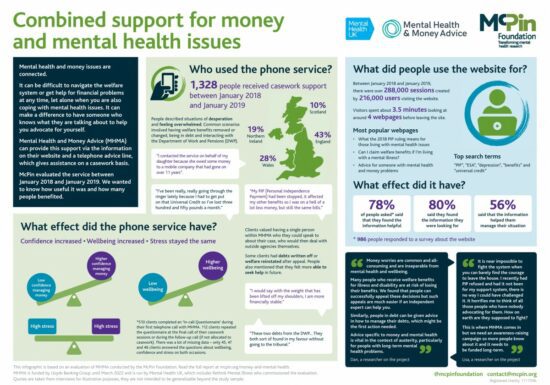Lisa Couperthwaite
We all know that money matters. No matter what adages and clichés we use, the bottom line is that life without money is pretty grim at best.
I’m not talking about designer clothes and exotic holidays. I’m talking about the minutiae of poverty, about not being able to afford to eat, about not having a bed to sleep in, about cowering in a corner terrified that the phone’s going to ring. About living life in constant fear of brown letters and that door knock that may well signify the arrival of the bailiffs.
I’m also talking about the more subtle effects of poverty, such as not being able to leave the house on a cold day because you don’t have a warm coat or shoes without holes in them. The impact on your social life because you are too embarrassed to have people round. You don’t want them to know that you don’t have a carpet, that the wallpaper is peeling and that there’s nothing at all that you can do about it.
As a peer researcher who has used mental health services for most of my adult life, I have found it difficult in the recent years of budget cuts to embark upon upcoming projects with any sense of optimism that they will have a real life impact.
However, against this backdrop of pessimism, media horror stories and the cruel statistics, there is Mental Health and Money Advice (MHMA). This service was launched by Mental Health UK in 2017 to address the interconnecting issues of money and mental health – one of the first in the UK to do so.
It incorporates its four member charities: Rethink Mental Illness (England), Hafal (Wales), Support in Mind (Scotland) and Mindwise (Northern Ireland) and works in partnership with Lloyds Banking Group.
The service consists of an easy to navigate website with information and resources, such as its Universal Credit Money Manager, but they also have a telephone service that works with clients on a case work basis and occasionally deals with one-off queries.
Breaking free of the vicious cycle
I was heartened to work on McPin’s evaluation of MHMA because it is an organisation that knows all about the reality of dealing with mental health and money issues, and proactively works with clients to find a way through this minefield.
It recognises the impact that these things have on each other and how they create a vicious cycle that has a tremendous knock-on effect on all areas of someone’s life, and which can be almost impossible to break.
While I was doing interviews for this evaluation, I got to speak to some of the people who had used the telephone case work service and heard for myself just how effective it is.
I spoke to a number of people who have had their PIP (Personal Independence Payment) decisions overturned as well as people whose debts have been written off. I also heard of times when it was the smallest, seemingly insignificant things that made a huge difference to people’s lives.
A valuable financial service
One story that moved me was from a man who could not afford a bed, all he had was a mattress on the floor. Unsurprisingly, not having basic furniture further added to his already significant battle with depression: “I remember having to pull a mattress from my bedroom when my old bed frame broke, into my living room and thinking about how crap my life is, sorry…”
MHMA found a charity that granted him £150 for a bed, but as the bed cost less they also sent him a cheque for the remaining amount because “every penny counts”. He bought a bedside light with this money and this enabled him to read at night which, in turn, helped him to get a better night’s sleep.
While this may seem small to those who have been lucky not to struggle with finances, he found it had a real impact on his mental health. It made him feel more like a human being and gave him the confidence to reach out. It gave him hope.
He sums this up perfectly when he says “Getting a positive response from them, it inspired me, it gave me hope and I’ve come a long way”.
For some bizarre reason, money is often an afterthought when considering mental health, especially when mental health issues are acute. However, as MHMA is showing, there is a real need for joined-up support and advice.
Our evaluation confirmed that the service is valued by the clients, especially those who receive the case work over the phone. I really hope that the service continues to receive funding and that it is promoted more widely, for example via GPs, so that more people can benefit.

Click here for more information about McPin’s evaluation of Mental Health and Money Advice.
Lisa Couperthwaite is a researcher at the McPin Foundation
